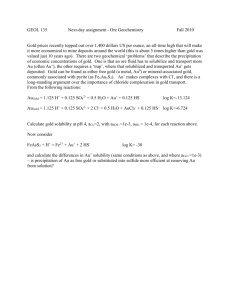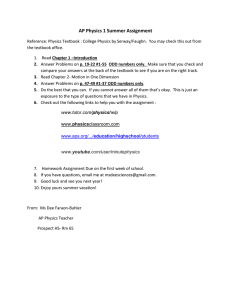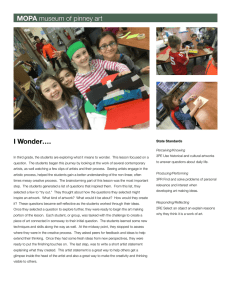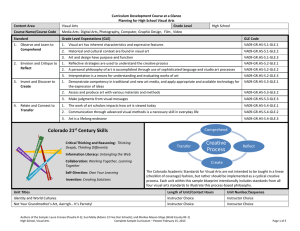Document 15590666
advertisement
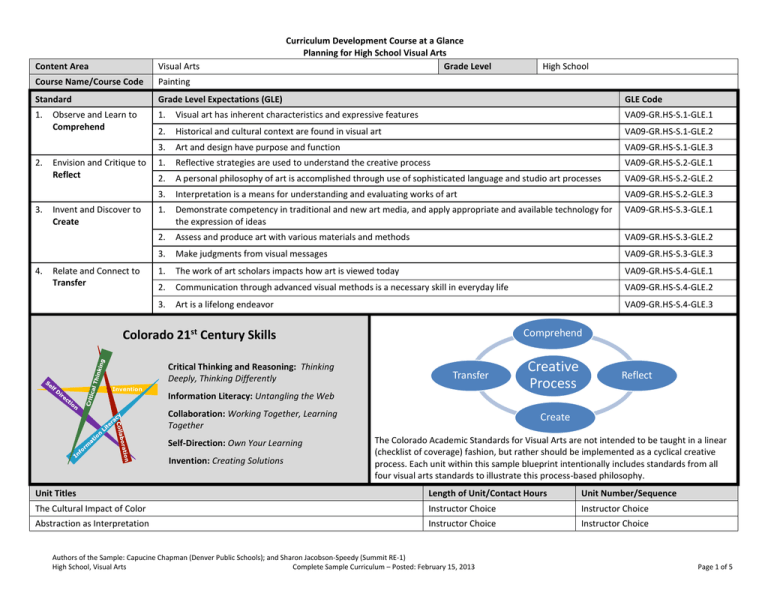
Curriculum Development Course at a Glance Planning for High School Visual Arts Grade Level Content Area Visual Arts Course Name/Course Code Painting Standard Grade Level Expectations (GLE) GLE Code 1. 1. Visual art has inherent characteristics and expressive features VA09-GR.HS-S.1-GLE.1 2. Historical and cultural context are found in visual art VA09-GR.HS-S.1-GLE.2 3. Art and design have purpose and function VA09-GR.HS-S.1-GLE.3 1. Reflective strategies are used to understand the creative process VA09-GR.HS-S.2-GLE.1 2. A personal philosophy of art is accomplished through use of sophisticated language and studio art processes VA09-GR.HS-S.2-GLE.2 3. Interpretation is a means for understanding and evaluating works of art VA09-GR.HS-S.2-GLE.3 1. Demonstrate competency in traditional and new art media, and apply appropriate and available technology for the expression of ideas VA09-GR.HS-S.3-GLE.1 2. Assess and produce art with various materials and methods VA09-GR.HS-S.3-GLE.2 3. Make judgments from visual messages VA09-GR.HS-S.3-GLE.3 1. The work of art scholars impacts how art is viewed today VA09-GR.HS-S.4-GLE.1 2. Communication through advanced visual methods is a necessary skill in everyday life VA09-GR.HS-S.4-GLE.2 3. Art is a lifelong endeavor VA09-GR.HS-S.4-GLE.3 2. 3. 4. Observe and Learn to Comprehend Envision and Critique to Reflect Invent and Discover to Create Relate and Connect to Transfer Colorado 21st Century Skills Critical Thinking and Reasoning: Thinking Deeply, Thinking Differently Invention High School Comprehend Transfer Creative Process Reflect Information Literacy: Untangling the Web Collaboration: Working Together, Learning Together Self-Direction: Own Your Learning Invention: Creating Solutions Create The Colorado Academic Standards for Visual Arts are not intended to be taught in a linear (checklist of coverage) fashion, but rather should be implemented as a cyclical creative process. Each unit within this sample blueprint intentionally includes standards from all four visual arts standards to illustrate this process-based philosophy. Unit Titles Length of Unit/Contact Hours Unit Number/Sequence The Cultural Impact of Color Instructor Choice Instructor Choice Abstraction as Interpretation Instructor Choice Instructor Choice Authors of the Sample: Capucine Chapman (Denver Public Schools); and Sharon Jacobson-Speedy (Summit RE-1) High School, Visual Arts Complete Sample Curriculum – Posted: February 15, 2013 Page 1 of 5 Curriculum Development Overview Unit Planning for High School Visual Arts Unit Title The Cultural Impact of Color Focusing Lens(es) Intention Inquiry Questions (EngagingDebatable): Unit Strands Comprehend/Reflect/Create/Transfer Concepts Characteristics and Expressive Features, Culture, Expression / Emotion, Tradition, Style, Investigate, Relationships / Interaction, Inspiration, Tension / Conflict, Intent, Color, Choices Length of Unit Standards and Grade Level Expectations Addressed in this Unit Instructor Choice VA09-GR.HS-S.1-GLE.1, VA09-GR.HS-S.1-GLE.2, VA09-GR.HS-S.1-GLE.3 VA09-GR.HS-S.2-GLE.1, VA09-GR.HS-S.2-GLE.2, VA09-GR.HS-S.2-GLE.3 VA09-GR.HS-S.3-GLE.1, VA09-GR.HS-S.3-GLE.2, VA09-GR.HS-S.3-GLE.3 VA09-GR.HS-S.4-GLE.1, VA09-GR.HS-S.4-GLE.2, VA09-GR.HS-S.4-GLE.3 How do cultures use color to convey meaning in traditional/contemporary rituals, celebrations, and daily lives? (VA09-Gr.HS- S.1-GLE.1,2,3) and (VA09Gr.HS-S.4-GLE.1-EO.a,b) How would the artist consider color choice in their artwork if the intent is to effect the viewer’s emotions? What processes guide an artist’s decisions when considering the use of color to depict tension or conflict? How can understanding the artist’s inspiration tell us more about the culture and how it’s expressed through color? Generalizations My students will Understand that… Guiding Questions Factual Conceptual Color in artwork expresses emotion to convey an artist’s personal style. (VA09-Gr.HS- S.1-GLE.1,2,3) and VA09Gr.HS- S.2-GLE.1,2,3) and (VA09-Gr.HS-S.3-GLE.2,3) and (VA09-Gr.HS-S.4-GLE.1,2,3) What does an artist need to know about cool and warm colors in relation to expressing emotion? Should color influence the creation of contemporary designs of products and fashion? Explain. Does product design unconsciously determine viewer (consumer) choice? Defend your response. Cultural traditions inform how artists investigate color. (VA09-Gr.HS- S.1-GLE.1,2,3) and VA09-Gr.HS- S.2GLE.1,2,3) and (VA09-Gr.HS-S.3-GLE.2,3) and (VA09Gr.HS-S.4-GLE.1,2,3) What techniques can an artist use with color to emphasize patterns significant to a culture? How can Interpreting color in visual arts provide the ability to understand the artist intent, style, and cultural traditions? Investigating the characteristics and expressive features of art inform the choices an artist can make to communicate intent (VA09-Gr.HS- S.1-GLE.1,2,3) and VA09-Gr.HS- S.2-GLE.1,2,3) and (VA09-Gr.HS-S.3-GLE.2,3) and (VA09-Gr.HS-S.4-GLE.1,2,3) How would the choice of color create movement, rhythm, and contrast in artwork? How important is it to identify specific characteristics and expressive features of art when analyzing color within the context of culture? Can an artist/designer effectively use color in a way counter to cultural expectations? Authors of the Sample: Capucine Chapman (Denver Public Schools); and Sharon Jacobson-Speedy (Summit RE-1) High School, Visual Arts Complete Sample Curriculum – Posted: February 15, 2013 Page 2 of 5 Curriculum Development Overview Unit Planning for High School Visual Arts Critical Content: Key Skills: My students will Know… My students will be able to (Do)… The foundation of color theory such as; primary, secondary, tertiary, hue, tint, shade, complimentary, contrast, etc. (VA09-Gr.HS-S.1-GLE.1,2) and (VA09-Gr.HSS.2-GLE.2) How color is used expressively to convey meaning and intent (VA09-Gr.HS-S.1GLE.1,2,3) and (VA09-Gr.HS-S.2-GLE.1,2,3) and (VA09-Gr.HS- S.4-GLE.1-EO.b) How color has been used by various artists and cultures, historically and culturally (Michelangelo Merisi da Caravaggio: known for chiaroscuro; Vincent Willem van Gogh: known for rough, emotional beauty and impasto; Aarti Wa Njoroge: contemporary African artist; José Clemente Orozco: Mexican social realist painter, and known for murals; Frida Kahlo de Rivera: Mexican painter, known for her selfportraits; Diego Rivera: known for works in fresco; Nguyễn Thị Châu Giang: contemporary female Vietnamese artist, known for visual narratives in traditional silk paintings; Faith Ringgold: African American artist, known for painting, quilts, storytelling, books (VA09-Gr.HS-S.1-GLE.1,2,.3) and (VA09-Gr.HS- S.2-GLE.1,2,3) and 9 VA09-Gr.HS-S.4-GLE.1-EO.b) Characteristics and expressive features of color (i.e., movement, rhythm, contrast, etc. (VA09-Gr.HS-S.1-GLE.1,2) and 9 VA09-Gr.HS- S.2-GLE.2-EO.b) Techniques to complete a painting that demonstrates knowledge of color choice that reflect cultural inspiration (VA09-Gr.HS-S.1-GLE.1,2,3) and (VA09-Gr.HS- S.2GLE.1,2,3) and (VA09-Gr.HS- S.3-GLE.1,2,3) and (VA09-Gr.HS- S.4-GLE.1-EO.b) Understand and apply the mixing of color (VA09-Gr.HS-S.1-GLE.1,2,3) and (VA09Gr.HS- S.2-GLE.1,2,3) and (;VA09-Gr.HS-S.3-GLE.1,2,3) and (VA09-Gr.HS-S.4-GLE.1EO.b) Demonstrate a variety of techniques when applying (VA09-Gr.HS-S.1-GLE.1,2,3) and (VA09-Gr.HS- S.2-GLE.1,2,3) and (;VA09-Gr.HS-S.3-GLE.1,2,3) and (VA09-Gr.HSS.4-GLE.1-EO.b) Describe how color choices convey the artist’s intentions (VA09-Gr.HS-S.1GLE.1,2,3) and (VA09-Gr.HS- S.2-GLE.1,2,3) and (VA09-Gr.HS- S.4-GLE.1-EO.b) Convey a personal understanding of color and style in their artwork (VA09-Gr.HSS.1-GLE.1,2,3) and (VA09-Gr.HS- S.2-GLE.1,2,3) and (VA09-Gr.HS- S.3-GLE.1,2,3) and (VA09-Gr.HS- S.4-GLE.1-EO.b) Critical Language: includes the Academic and Technical vocabulary, semantics, and discourse which are particular to and necessary for accessing a given discipline. EXAMPLE: A student in Language Arts can demonstrate the ability to apply and comprehend critical language through the following statement: “Mark Twain exposes the hypocrisy of slavery through the use of satire.” A student in ______________ can demonstrate the ability to apply and comprehend critical language through the following statement(s): Through the understanding and use of color, artists can create artwork that conveys culture and style. Academic Vocabulary: Primary, secondary, tertiary, hue, tint, shade, complimentary, warm, cool, contrast, rhythm, movement, technique, Culture, Expression / Emotion, Tradition, Style, Investigate, Relationships / Interaction, Inspiration, Intention, Tension / conflict Technical Vocabulary: Characteristics and expressive features of art, chiaroscuro, fresco Authors of the Sample: Capucine Chapman (Denver Public Schools); and Sharon Jacobson-Speedy (Summit RE-1) High School, Visual Arts Complete Sample Curriculum – Posted: February 15, 2013 Page 3 of 5 Curriculum Development Overview Unit Planning for High School Visual Arts Unit Title Abstraction as Interpretation Focusing Lens(es) Choices Inquiry Questions (EngagingDebatable): Unit Strands Comprehend/Reflect/Create/Transfer Concepts Proportion, Laws and Rules, Composition, Order and Space, Value, Style, Organic, Transformation, Intention Length of Unit Standards and Grade Level Expectations Addressed in this Unit Instructor Choice VA09-GR.HS-S.1-GLE.1, VA09-GR.HS-S.1-GLE.2, VA09-GR.HS-S.1-GLE.3 VA09-GR.HS-S.2-GLE.1, VA09-GR.HS-S.2-GLE.2, VA09-GR.HS-S.2-GLE.3 VA09-GR.HS-S.3-GLE.1, VA09-GR.HS-S.3-GLE.2, VA09-GR.HS-S.3-GLE.3 VA09-GR.HS-S.4-GLE.1, VA09-GR.HS-S.4-GLE.2, VA09-GR.HS-S.4-GLE.3 What does transformation have to do with Abstract Art? (VA09-Gr.HS-S.1-GLE.1,2,3) and (VA09-Gr.HS- S.2-GLE.3) and (VA09-Gr.HS-S.4-GLE.1-EO.a,b) How does abstraction affect how a viewer might react to a work of work? Would something (idea, place, or portrait) be better interpreted abstractly rather than realistically? Why? Why has Abstract Art developed through time and culture? Generalizations My students will Understand that… Guiding Questions Factual Conceptual The laws and rules of visual art can influence or change compositional choices. (VA09-Gr.HS-S.1-GLE.1,2,3) and 9 VA09-Gr.HS- S.2-GLE.1,2,3) and (VA09-Gr.HS- S.3-GLE.2,3) and (VA09-Gr.HS- S.4-GLE.1,2,3) What is the Rule of Thirds? How could the Rules of Thirds be changed to create an abstracted form or shape? How would the composition of a painting change the tension or dynamics of the artwork? Should artwork evoke negative responses in a viewer? Explain. The order of lines, forms and shapes determines compositional design, creating meaning. (VA09-Gr.HS-S.1GLE.1,2,3) and 9 VA09-Gr.HS- S.2-GLE.1,2,3) and (VA09Gr.HS- S.3-GLE.2,3) and (VA09-Gr.HS- S.4-GLE.1,2,3) What is the difference between shapes and forms? What is the difference between realism and abstraction? How do artists use realism as a basis to create abstracted form or shape? Why should an artist consider the size of shapes and forms within a composition to convey intended purpose? Organic composition is one of many styles artists employ to express intent. (VA09-Gr.HS-S.1-GLE.1,2,3) and 9 VA09Gr.HS- S.2-GLE.1,2,3) and (VA09-Gr.HS- S.3-GLE.2,3) and (VA09-Gr.HS- S.4-GLE.1,2,3) How is abstract art different than non-objective art? How do abstract painters define space and form in their work. Should an artist’s style evolve and transform--through using the characteristic and expressive features of art—over time? Explain. Is abstraction, to present an interpretation of place, space, identity or idea in art, an effect way to present these ideas to the viewer? Explain. Authors of the Sample: Capucine Chapman (Denver Public Schools); and Sharon Jacobson-Speedy (Summit RE-1) High School, Visual Arts Complete Sample Curriculum – Posted: February 15, 2013 Page 4 of 5 Curriculum Development Overview Unit Planning for High School Visual Arts Critical Content: Key Skills: My students will Know… My students will be able to (Do)… How artists use abstraction to present an interpretation of place, space, identity or idea (VA09-Gr.HS-S.1-GLE.1,2) and (VA09-Gr.HS-S.2-GLE.2-EO.b) The continuum along which abstraction exists; this departure from accurate representation can be only slight, or it can be partial, or it can be complete (VA09-Gr.HS-S.1-GLE.1,2)and (VA09-Gr.HS-S.2-GLE.2-EO.b) How abstraction has been used by various artists and cultures, historically and culturally (M. C. Escher: Dutch graphic artist, known for tessellations and positive/negative space; Georges Braque: known for cubism; Amedeo Clemente Modigliani: known for mask like faces and elongated form; Madeline Denaro: contemporary female Abstract Artist; Philip Guston: known for abstract “cartoon” renderings; Reginald Laurent: contemporary African American abstract artist, known for bright color and detailed images) (VA09-Gr.HS-S.1GLE.1,2,3) and (VA09-Gr.HS-S.2-GLE.1,2,3) and (VA09-Gr.HS- S.4-GLE.1-EO.b) Compositional laws and rules Ways of abstracting shapes and forms (VA09-Gr.HS-S.1-GLE.1,2) and (VA09-Gr.HS-S.2GLE.2-EO.b) Shapes, forms and other compositional elements that create abstraction need to be arranged within their working space Ways of abstracting shapes and forms (VA09-Gr.HS-S.1-GLE.1,2,3) and (VA09-Gr.HS-S.2GLE.1,2,3) and VA09-Gr.HS-S.4-GLE.1-EO.b) The difference between representational, abstract and non-objective How to apply the Rule of Thirds (VA09-Gr.HS-S.1-GLE.1,2) and (VA09-Gr.HS- S.2-GLE.2-EO.b) Create value scale with color using tints and shades (VA09-Gr.HS-S.1GLE.1,2,3) and (VA09-Gr.HS-S.2-GLE.1,2,3) and (VA09-Gr.HS- S.4-GLE.1EO.b) Arrange shapes and forms within their working space to create abstraction (VA09-Gr.HS-S.1-GLE.1,2,3) and (VA09-Gr.HS-S.2-GLE.1,2,3) and (VA09-Gr.HS- S.4-GLE.1-EO.b) Produce abstract paintings that are interpretations of place, space, identity or idea along a continuum; this departure from accurate representation can be only slight, or it can be partial, or it can be complete (VA09-Gr.HS-S.1-GLE.1,2,3) and (VA09-Gr.HS-S.2-GLE.1,2,3) and (VA09-Gr.HS- S.4-GLE.1-EO.b) Demonstrate knowledge and understanding of compositional rules and laws (VA09-Gr.HS-S.1-GLE.1,2,3) and (VA09-Gr.HS-S.2-GLE.1,2,3) and VA09-Gr.HS-S.4-GLE.1-EO.b) Combine complimentary color mixing to create neutrals (VA09-Gr.HS-S.1GLE.1,.2) and (VA09-Gr.HS-S.2-GLE.2-EO.b) Use tints and shades to enhance values in paintings (VA09-Gr.HS-S.1GLE.1,2) and (VA09-Gr.HS- S.2-GLE.2-EO.b) Critical Language: includes the Academic and Technical vocabulary, semantics, and discourse which are particular to and necessary for accessing a given discipline. EXAMPLE: A student in Language Arts can demonstrate the ability to apply and comprehend critical language through the following statement: “Mark Twain exposes the hypocrisy of slavery through the use of satire.” A student in ______________ can demonstrate the ability to apply and comprehend critical language through the following statement(s): Through the process of abstraction artists use shapes and forms to create artwork. Academic Vocabulary: Realism, Abstract, value, complimentary, shapes, forms, scale, tints, shades, transformation, composition, proportion Technical Vocabulary: Characteristic and Expressive features in art, Rule of Thirds, cubism Authors of the Sample: Capucine Chapman (Denver Public Schools); and Sharon Jacobson-Speedy (Summit RE-1) High School, Visual Arts Complete Sample Curriculum – Posted: February 15, 2013 Page 5 of 5
